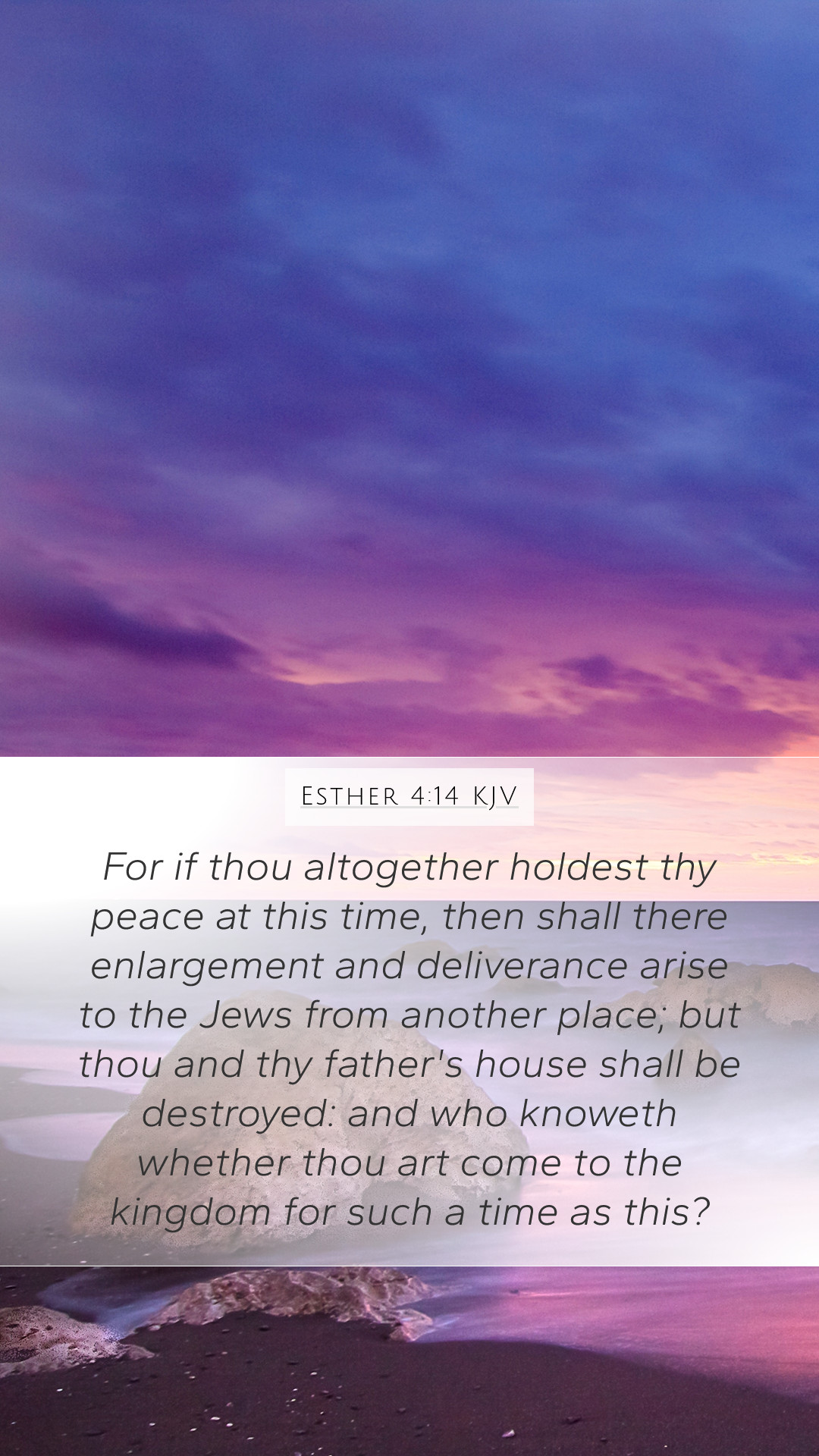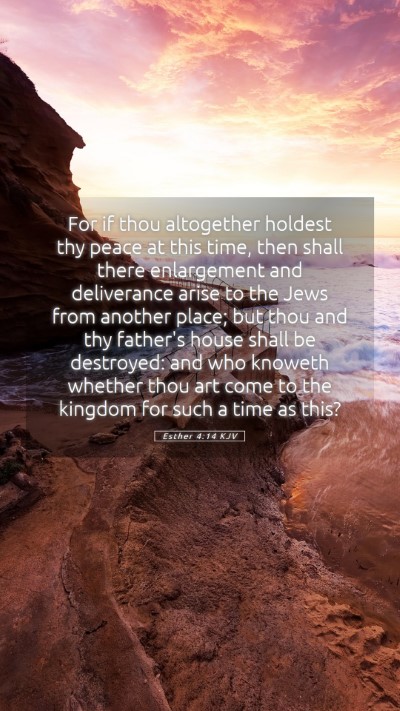Old Testament
Genesis Exodus Leviticus Numbers Deuteronomy Joshua Judges Ruth 1 Samuel 2 Samuel 1 Kings 2 Kings 1 Chronicles 2 Chronicles Ezra Nehemiah Esther Job Psalms Proverbs Ecclesiastes Song of Solomon Isaiah Jeremiah Lamentations Ezekiel Daniel Hosea Joel Amos Obadiah Jonah Micah Nahum Habakkuk Zephaniah Haggai Zechariah MalachiEsther 4:14 Meaning
What is the meaning of Esther 4:14?
For if thou altogether holdest thy peace at this time, then shall there enlargement and deliverance arise to the Jews from another place; but thou and thy father's house shall be destroyed: and who knoweth whether thou art come to the kingdom for such a time as this?
Esther 4:14 Bible Verse Meaning
Understanding Esther 4:14
Esther 4:14: "For if you remain completely silent at this time, relief and deliverance will arise for the Jews from another place, but you and your father's house will perish. Yet who knows whether you have come to the kingdom for such a time as this?"
This verse carries significant weight in the context of the story of Esther. To grasp its full meaning, we must consider the circumstances surrounding Esther and the Jewish people at this pivotal moment.
Summary of Insights from Public Domain Commentaries
- Matthew Henry: Henry emphasizes the importance of Esther's position within the royal court and the divine providence that placed her there. He notes that Mordecai's challenge to Esther illustrates the need for boldness and faith in divine purpose. The suggestion that help for the Jews may come from elsewhere highlights God's sovereignty and ability to deliver His people, regardless of human action.
- Albert Barnes: Barnes focuses on the notion of divine timing and purpose. He interprets Mordecai's words as a call to action for Esther, posing the question of whether her rise to royalty was meant to be for her people's salvation. He highlights the importance of individual responsibility in fulfilling God’s plan.
- Adam Clarke: Clarke discusses the gravity of Esther's choice and the potential consequences of her inaction. He reflects on the moral implications of remaining silent when action could lead to salvation. Clarke also comments on the idea of God providing a way of escape, even when one does not conform to His will, showcasing the depth of God’s mercy and justice.
Main Themes and Analysis
The verse encapsulates several core themes that resonate throughout the Bible:
- Divine Providence: The affirmation that "relief and deliverance will arise" serves as a reminder of God’s overarching control. This assurance underscores that even amidst dire circumstances, God's plans cannot be thwarted.
- Individual Responsibility: Esther is called to action, reflecting the belief that individuals play crucial roles within God’s plan. The question, "who knows whether you have come to the kingdom for such a time as this?" challenges readers to evaluate their own lives and the possible purposes God may have for them.
- Consequences of Inaction: The warning that Esther's silence may lead to destruction not only for herself but for her father’s house serves as a sobering reminder of the consequences of failing to take action when it is morally necessary.
- Call to Courage: Esther’s decision to speak out is depicted as a moment of courage in the face of potential peril. This theme encourages believers to act with boldness, trusting in God’s guidance and provision.
Application of Esther 4:14 in Daily Life
Esther 4:14 invites believers to consider their own circumstances and potential calls to action:
- Recognizing Divine Opportunities: Just as Esther faced a crucial moment, so do individuals today encounter times when their voices and actions can lead to significant change.
- Reflecting on Personal Purpose: The call to "who knows" positions believers to contemplate their purpose and role within their communities—whether that be within their jobs, schools, or churches.
- Taking Bold Steps: The motivation to act courageously, despite fears of consequence, resonates deeply. It encourages believers to step out in faith for causes that reflect God’s justice and mercy.
Related Bible Cross References
- Esther 2:17: Highlights Esther's rise to being queen, connecting to the theme of divine providence.
- Romans 8:28: The assurance that God works all things together for good aligns with the theme of divine purpose.
- Jeremiah 29:11: God's plans for His people further supports the notion of a divine purpose in every situation.
Conclusion
Esther 4:14 serves not only as a pivotal moment in the Book of Esther but also as a timeless reminder of the importance of recognizing and responding to God's call. As believers explore this verse, they are encouraged to seek its implications for their own lives, finding ways to engage with God’s purposes and act with courage. Through understanding Scripture, they can appreciate the depths of divine providence, individual responsibility, and the call to courageous living.


